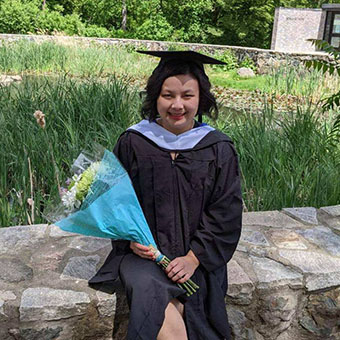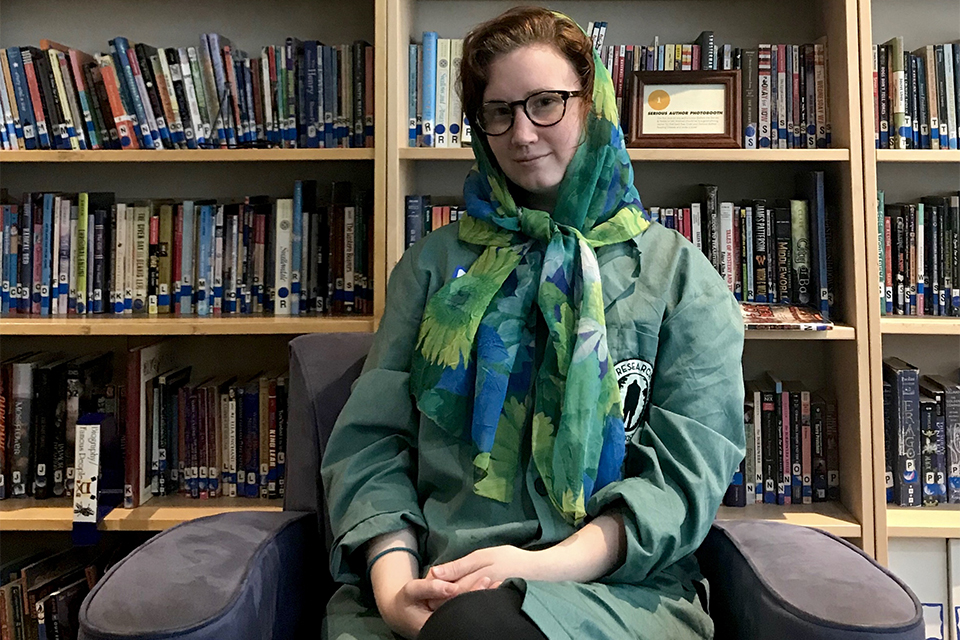Selected Alumni Abstracts
Students in the joint Master of Arts degree study a wide range of interdisciplinary approaches and emerge with crucial research and communication skills. After graduation, Brandeis Alumni go on to a variety of careers as well as making significant contributions to academic, civic, and other organizations.Selected Alumni Abstracts
- Project title: "Feminist representations of rape and fantasy fiction"
Abstract
Fictional literary representation of rape has been a contentious topic in feminist discourse for decades. Misogynistic literature has misrepresented sexual violence and coercion as pleasurable and romantic directly connecting to restrictive legal definitions of rape which made it difficult to prove or seek justice for victim-survivors. Many feminist thinkers have advocated for new forms of feminist representation that put the harm and trauma back into rape, a feminist realist approach to literature. The emphasis on feminist representation of reality comes into conflict with the very structure of fantasy literature which is characterized by its unrealism. This paper explores this conflict in representative aims between feminist realism and the fantastic, and how feminist-aligned authors of fantasy literature have taken up sexual violence as a theme worthy of exploration in an unrealistic mode. What place does rape have in fantasy literature, what pitfalls and opportunities do these authors encounter, and what new worlds do they invite us to imagine?

-
Project title: Coming Out of the Confessional: Catholicism and the Gay Adolescent in Contemporary Media
Abstract
This paper is a multigenre examination of the ways in which contemporary media portrays queer-identifying adolescents raised in a Catholic environment. Major texts examined include Damon Intrabartolo's Bare: A Pop Opera, Sonora Reyes's The Lesbiana's Guide to Catholic School, and Matt Ortile's The Groom Will Keep His Name. While Catholicism is often hostile to gay and queer individuals, these texts demonstrate the ways in which the gay teen can negotiate their own identity and develop survival strategies within a Catholic environment. Rather than simply being passive recipients of institutional homophobia, these texts demonstrate that queer teens are able to "talk back" within their religious tradition by leveraging found family, restructured ritual, strategic silence, and other forms of active and passive resistance to challenge the institutions of the Church from within and create new, unique traditions of their own. These strategies do not negate or invalidate the harm done by institutional bigotry, but they do provide a roadmap for future efforts at institutional reform within religious institutions, and speak to the complexity found at the intersection between these religious and sexual identities.

-
Project title: Maternal Orientalism: Chinese Transracial Adoption, White Motherhood and the Construction of the Chinese Birth Mother
Abstract
This article examines three documentaries about transracial adoption from China to the United States: "Adopted," "Found in China" and "Somewhere Between." In each film, familiar patterns of white saviorism, colorblind racism, and American exceptionalism combine to create and sustain a sentimental image of transracial adoption. In response, I develop the term “maternal Orientalism” to describe the racialized and gendered ways in which the white adoptive parents construct the Chinese birth mother.
Section 1 explores "Adopted" and draws out the often-overlooked continuities between Korean and Chinese adoption. In Section 2, I discuss "Found in China"and "Somewhere Between," both of which document heritage trips, in tandem. Together, they demonstrate how adoptees often internalize mythical narratives of war and rescue that dominate the white American imagination. Furthermore, I demonstrate how, in order to protect the structure of the white adoptive family, adoptees themselves may inadvertently reify problematic constructions of the Chinese birth mother. By listening to and centering the voices of adoptees, rather than their white adoptive parents, this paper advances the field of critical adoption studies and expands our understandings of transracial adoptees who embody a complicated intersection of race, gender, nation and kinship.

-
Project title: Getting Gritty With It: The Politics of Cultural Production Under Late Capitalism
Abstract
In this paper, I explore how the NHL mascot Gritty exemplifies the fraught relationship between work and play in late-stage capitalism, one I show to be particularly tangled in professional sports, and Gritty’s relationship to this tension is what makes him relatable to so many young, left-leaning people who have had to struggle in the gig economy. Using Sianne Ngai’s theoretical framework in "Our Aesthetic Categories: Zany, Cute, Interesting," I analyze Gritty as an emblematic zany figure — understanding his performance “as not just artful play but affective labor” and as expressive of white male anxieties about the feminization of labor (1). At the same time, I argue that Gritty resonates with many left-leaning people because they are accepting of the anxieties he represents. I try to better understand the paradox of why Gritty, as a capitalist marketing tool, has become a symbol in the leftist movement. As I examine memes and viral content, I consider the role that race has played in popularizing Gritty — a mascot arguably coded through white masculinity that has used historically Black methods of cultural production to rise to fame. These explorations lead me toward a meditation on the question of whether cultural subversion is truly possible within a system that frequently profits from this resistance.

-
Project title: “Suicide Is, After All, The Opposite Of A Poem”: The Relationship Between Posthumous Publications, Suicide, and Legacy Within Anne Sexton and Sylvia Plath
Abstract
When any celebrity dies suddenly or tragically, their whole life's works, material objects,
and personal writings now become situated within the context of their death. Stripped of their living agency, their voice must now be found within whatever personal documents they left behind. Often, the success of a posthumous existence is dictated by how a celebrity dies. When and how a celebrity dies, and at what age, become crucial components of their legacy. Sylvia Plath and Anne Sexton are two of the most famous women in 20th-century poetry, and I believe that part of this recognition is directly traced to people’s fascination with the tragedies that occurred in their lives and writing. By comparing the two poets’ relationship with each other, their works, and the culture in which they lived, I argue that Plath’s death and her pre- and post-mortem success affected Sexton, who also died by suicide and had multiple works published posthumously, further solidifying similarities between the two.
Finally, I argue that we give suicide an undeserving weight in both women’s legacies. It is too easy to remember them as suicidal and sad women because of their deaths. However, Sexton and Plath’s melancholy was a significant aspect of their lives, and it would also be as much a disservice to cut it out of their lives completely. Readers and scholars must treat both women, their writings, and their legacies with compassion and nuance. Rather than ignore or dismiss their illnesses and deaths, I read for the ways that both life, death, joy, and depression appear in their lives, hopefully affording both women the chance to be seen as fully human rather than embodiments of mental illnesses.
-
Project title: “Compassionate Women” and “Lying Men:" Biblical Interpretation and Gender in Aemilia Lanyer’s “Salve Deus Rex Judæorum” and Arcangela Tarabotti’s "Paternal Tyranny"
Abstract
Words like “freedom” and “liberty” are often overused in the modern world. However, at their heart, they represent extremely high stakes and material consequences that lie at the center of any progressive society. During the enlightenment, these ideas were being heavily explored as society grappled with the parameters of freedom — how far it extended, upon what grounds, and to whom. For Renaissance women, these questions had heavy implications, and as such were the subject of much debate.
For two women of the seventeenth century in particular, these questions were highly personal, and each decided to answer them by taking up the pen and becoming a writer, albeit of very different kinds. The first, Aemilia Lanyer, became the first British woman to publish an entire volume of poetry, complete with prefatory dedicatory verses that requested patronage from some of the most powerful women in Britain. The other, an Italian nun, Arcangela Tarabotti, issued a polemical manifesto arguing for the emancipation of Venetian women who were being detained against their will, which included a literary debate against one of the foremost writers in Italy. Each of these objectives demanded deliberate planning and inventiveness in order to be heard and to have any possibility of being taken seriously. Perhaps surprisingly both of these women writers, half a continent and four decades apart, came to similar conclusions about how best to approach their problems: biblical exegesis.
In this paper, I engage in a comparative textual analysis of the work of Tarabotti’s "Paternal Tyranny" and Lanyer’s “Salue Deus Rex Judæorum." In each of these texts, the authors engage in biblical interpretation that radically alters the ways in which certain scriptures are read, thus attempting to reform the biblical basis for Renaissance views on women. Their approach to this illustrates an alternative possibility for practices around reading and writing about women, creating a rupture in early modern gender views.